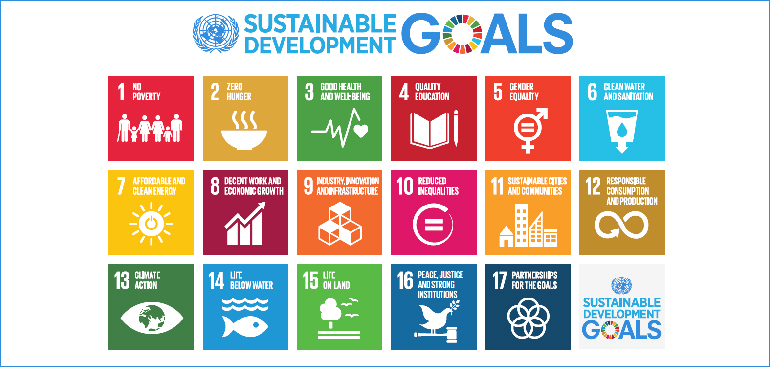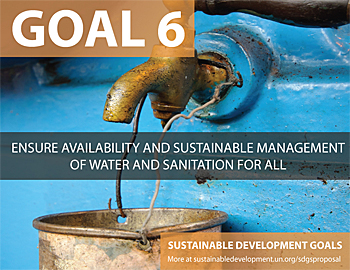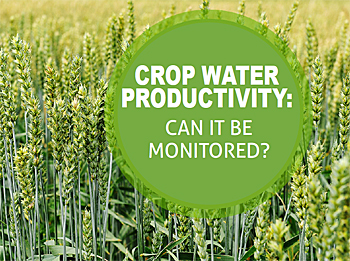Water education institute Unesco-IHE in action for sustainable development goal 6 on water
 Dutch-based institute for water education Unesco-IHE, started several actions to support the achievement of Sustainable Development Goal 6 on water. This goal is to ensure universal access to water and sanitation by 2030, and is to be adopted at the special United Nation's summit on 25 -27 September in New York.
Dutch-based institute for water education Unesco-IHE, started several actions to support the achievement of Sustainable Development Goal 6 on water. This goal is to ensure universal access to water and sanitation by 2030, and is to be adopted at the special United Nation's summit on 25 -27 September in New York.
The SDG goal 6 on water broadens the Millennium Development Goal on water that will expire at the end of this year.
The SDG 6 on water is one of the 17 goals that have been defined by the United Nations to end poverty and to better meet human needs, while protecting our environment, ensuring peace and realizing human rights.
The new SDG goal on water also aims at halving the discharge of untreated waste water, a significant increase of efficient water use and reduction of stress on water resources.
 Review of activities that contribute of SDG6
Review of activities that contribute of SDG6
Much of Unesco-IHE's work contributes to educating water professionals, undertaking research and developing innovative solutions to sanitation, environment and food security challenges.
On its website the institute listed a number of specific activities that contribute of the achievement od the SDG nr.6 on water.
Wetlands and food production
Wetlands play an important role in several of the SDGs, including those on food security and poverty eradication, ecosystems and biodiversity, water and climate change adaptation. If disconnected, actions taken to achieve one goal can easily conflict with other legitimate priorities.
Professor Ken Irvine of Unesco-IHE moderated a seminar on this topic at World Water Week in Stockholm on 23 August 2015. The aim was to build bridges between often disconnected communities, for human development in wetlands, ecosystem protection, and agricultural investments and promote a fruitful dialogue to improve policies for sustainable wetland use.
Lecture series in Water
Both professors Margreet Zwarteveen and Joyeeta Gupta from Unesco-IHE are involved in a 'special lecture series' at the University of Amsterdam (UvA) which will be held in the first semester of 2015-2016. The theme of this year is Water: Avoiding water wars. Governing water resources in the south.
The lectures will highlight problems and opportunities associated with fresh and salt water in developing nations of Africa, Asia and Latin America.
 More crop per drop
More crop per drop
The development of technology tools for achieving SDG nr.2 on food security, especially under conditions of water scarcity, is thriving. One of these new tools is the use of near real-time available data on crop production and water productivity, obtained from satellite images. A database with information on water productivity in the African continent will be launched by the end of this year.
This database can be used by policy makers, water managers and farmers to propose solutions to reduce water productivity gaps, while taking into account ecosystems services and the equitable use of water resources.
Water security projects
Unesco-IHE has been and is involved in a variety of water security related projects, where research is being carried out on for instance drought forecasting, groundwater dynamics, innovative agricultural practices, IT solutions, water scarcity & water abundance and integrated water resources management.
Some of these projects include:
● DEWFORA: drought forecasting in Africa
● ESCACES: Evaluating groundwater in times of scarcity and of abundance in Colombia
● EartH2Observe: Global Earth Observation for Integrated Water Resource Assessment
● MaMaSe: Improving water safety and security in the Mara River Basin in Kenya
● Mobile water management in Mozambique
This news item was originally published on the website of Unesco-IHE: part 1 and part 2.
More information
Unesco-IHE Institute of water education
Delft, the Netherlands
+31 15 212 29 21
www.unesco-ihe.org
UN Sustainable development summit 2015
www.un.org/sustainabledevelopment/summit/



